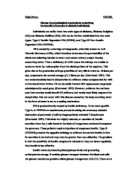Effects of metabolic bi-products
Lactic acid is the main bi-product of anaerobic glycolysis. Blood always contains small amount of lactic acid, however, during high intensity exercise this increases greatly. The increased production of lactic acid results in the pH of the blood decreasing. A blood pH of 6.4 or lower affects muscle and neural functions.
Onset blood lactate accumulation (OBLA)
OBLA is also known as the anaerobic threshold. OBLA is the point at which lactic acid begins to accumulate in the muscles. OBLA is considered to occur somewhere between 85% and 90% of your maximum heart rate.
The recovery process
Oxygen debt
Oxygen debt occurs when the exercise performed is completely or to some extent anaerobic. When this happens, PC stores are depleted and lactic acid builds up inside the muscle. Oxygen is then required to break down the lactic acid and convert it back to pyruvic acid. Therefore, the heart rate and respiratory rate should remain elevated for a period of time after the main exercise has been complete in order to allow for the pay back of the oxygen debt.
After a session of dynamic exercise, five events must happen before the muscle can operate again:
- ATP must be replaced
- PC stores must be replenished
- Lactic acid must be removed
- Myoglobin must be replenished with oxygen
- Glycogen stores must be replenished
The replacement of ATP and PC, and the removal of lactic acid take place within 20 minutes of stopping exercise, but the oxygen replenishment of myoglobin and refilling the glycogen stores take between 24 and 48 hours. If the exercise session was of a very high intensity then it will take longer to recover, however, the fitter you are the faster you will recover. The faster the debt can be repaid, the more quickly the performer can exercise again. The oxygen debt consists of two separate components: the alactacid debt and the lactacid debt.
Alactacid oxygen debt is the process of recovery that does not involve lactic acid. The aerobic energy system is used to produce the ATP required to replenish the PC stores and ATP stores in the body:
ADP + P + Oxygen → ATP
ATP + C + P → PC + ADP
Around 50% of the replenishment occurs during the first 30 seconds, while full recovery occurs at about three minutes.
The alactacid oxygen debt ranges between 2 to 3.5 litres of oxygen. The fitter you are, the greater the debt because training increases the PC content within the muscle cells. However, the recovery time of a fitter person is reduced because they have enhanced methods of oxygen delivery such as increased capilliarisation and an improved cardio respiratory system, which will increase the rate of ATP production from the aerobic energy system.
The lactacid oxygen debt takes much longer to complete and can last for minutes or hours, depending on the severity of the exercise. The process involves oxygen, which is required to break down the lactic acid produced during anaerobic glycolysis into pyruvate. Pyruvate can then enter the aerobic energy system and eventually be broken down into carbon dioxide and water.
Lactic acid + oxygen = pyruvate
Lactic acid can also be converted in the liver to glycogen and stored either in the liver or in muscle tissue. Research has shown that an active recovery increases the rate of removal of lactic acid, so walking or slow jogging after exercising will help to decrease the time it takes to rid the body of lactic acid. An active recovery keeps the heart rate and breathing rate up, which has the effect of increasing the rate of delivery of oxygen to the working muscles, which will then help to rid the body of the lactic acid. Therefore, a cool down is very important after any form of activity in order to maximise recovery. Failure to cool down adequately means that the levels of lactic acid will remain elevated. It is thought that this acidity level affects the pain receptors and contributes to muscle soreness which people may feel some times after having exercise. This muscle soreness, termed ‘delayed onset of muscle soreness’ (DOMS), is at its most uncomfortable 36 to 48 hours after exercise has ceased.
Muscle glycogen stores must also be restored. This is attained through a high carbohydrates diet and rest, and can take several days to recover, depending on the intensity of the exercise.
Excess post-exercise oxygen consumption (EPOC)
Oxygen debt is occasionally called EPOC. EPOC refers to the total oxygen consumed after exercise in excess of a pre-exercise baseline level. EPOC occurs when a person exercises at high intensity, when oxygen cannot be supplied by the anaerobic energy systems, which results in lactic acid production. When the person stops exercising, extra oxygen is breathed in order to break down lactic acid to carbon dioxide and water, to replenish ATP, phosphocreatine and glycogen, and to pay back any oxygen that has been borrowed from haemoglobin and myoglobin.
Training and its effect on fatigue
Training has the effect of increasing the body’s ability to exercise for longer without tiring. However, it is necessary to carry out specific training in order to ensure the body adapts to the type of exercise an athlete is competing in, i.e. a marathon runner would have to run persistently for long distances in order to adapt their body to increase the aerobic production of ATP. A sprinter, on the other hand, would have to train anaerobically in order to increase their tolerance to lactic acid and increase their PC stores.
Exercise Physiology Page of Task 4







